
|  |  |  Health & Beauty | August 2008 Health & Beauty | August 2008  
Don't Make Criminals Out of Drug Users - Experts
 Tan Ee Lyn - Reuters Tan Ee Lyn - Reuters
go to original


| | An AIDS activist pins on a red ribbon during a protest inside the European Parliament marking the World AIDS Day in Brussels, December 1, 2005. Drug abusers benefit just as much from HIV drugs as people who are infected sexually or some other way, Canadian researchers reported on Sunday. (Reuters/Francois Lenoir) | | |
Mexico City - Injecting drug users are denied HIV drugs in some places in the world, making it much more difficult to combat the epidemic, experts told a conference on Tuesday.

Drug users have spouses, children and often multiple sex partners, making them a major vector of HIV transmission. In Thailand, they are randomly rounded up, publicly humiliated and jailed, said Paisan Suwannawong of the non-government Thai AIDS Treatment Action Group.

"Police have to meet their quotas so they arrest IDUs (injecting drug users) and throw them behind bars. They are forced into cold turkey without any kind of help. Some are even randomly killed and these cases are not investigated," Suwannawong said in an interview after delivering a speech at the international AIDS conference in Mexico City.

"They are stigmatized and not accepted as humans. Police shave their heads and make them run around their villages to humiliate them. They are not given HIV drugs because people think they can't adhere to treatment."

"But IDUs are the only high-risk group in Thailand experiencing no reduction in HIV prevalence in 20 years and they make up 25 percent of all new infections ... they must be given HIV drugs," said Suwannawong.

A study published on Sunday in the Journal of the American Medical Association challenged the notion that drug users do not stick to HIV treatments.

Suwannawong and other panelists called for more humane treatment of drug users, recommending strategies such as clean needle exchange programs.

But many governments fear that needle exchange programs condone drug use and refuse to implement them. The U.S. federal government opposes such programs, although some U.S. cities have legalized them.

"With drug users, it's the stigma, the criminalization and legal policies that inhibit the implementation of these programs ... Criminalization and law enforcement have taken over harm reduction," Adeeba Kamarulzaman, head professor of infectious diseases at the University of Malaya in Malaysia, told the conference.

Injecting drug users make up 30 percent of all new infections outside sub-Saharan Africa and 89 percent of all new cases in Asia.

In the United States, between 25 and 33 percent of injecting drug users are infected with HIV.

But in Australia, where clean needle exchange is widely promoted, only 3 percent to 6 percent of injecting drug users are HIV positive, said Kamarulzaman, who also heads the Malaysian AIDS Council.

Needle exchange programs exist in 77 countries but in China and Malaysia, for example, anti-narcotics police still conduct raids on needle-exchange sites, which only drive drug users further underground, Kamarulzaman said.

(Editing by Alan Elsner) |

 |
|  |



